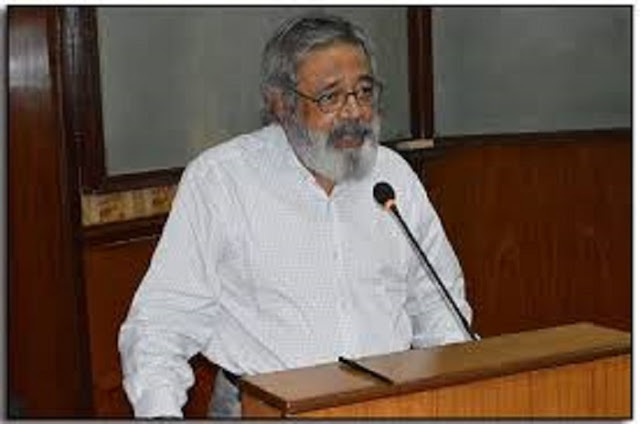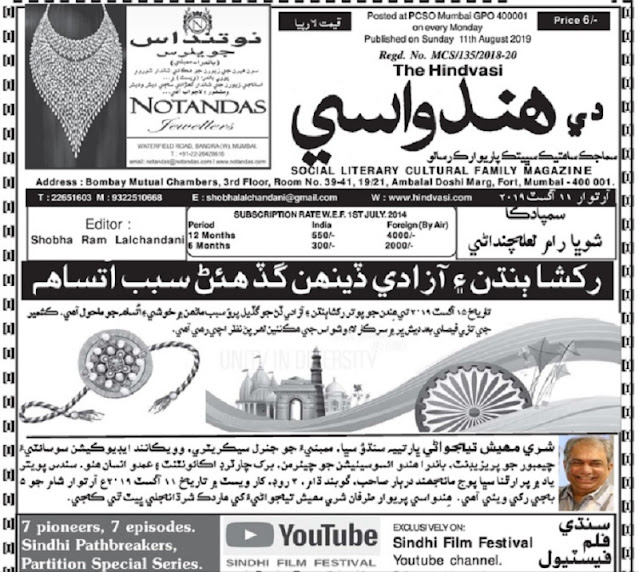Columns: A Must Read Book By Amar Jaleel
Amar Jaleel is one of the widely read authors of Sindhi language, who can be undoubtedly called a trend-setter and torch-bearer in Sindhi prose. Mystic by nature Amar pin-points most horrifying issues with his tremendous sense of humour. Probably the only Sindhi writer, who is now writing continuously since six decades. Though his specialty is short-story, but he has given a new way of expression especially in Sindhi journalism through his creative columns.
Over years only seven to eight books penned by Jaleel were marketed including: “Dil Jee Duniya” (Collection of Short Stories), “Jeedhan Maan Naa Hundoos” (Collection of Short Stories), “Sindhu Muhanjee Saah Main” (Collection of Columns), “Ranikot Jo Khazanoo” (Collection of Short Stories), “Tareekh Jo Kafan” (Collection of Short Stories), “Muhanjo Dus Asamanan Khan Puchjo” (Collection of Short Stories), “Tiyoon Wajood” (Collection of Short Stories), and “Neth Gungay Ghalayo” (A Novel).
Later on it was Mukhtiar Mallah who started to compile Jaleel’s work published in various journals and newspapers, and publicized in book form by Kachho Publication Karachi from 2008-till today, various books authored by Amar such as “Jeejal Munhji Mao” (2008), “Endra” (2009), first published under the title “Munhjoon Awallein Khaniyoon”, “Sird Lash Jo Safar” (2010), “Abad ain Siyashat” (2010), “Lehandar Sijh Jee Lam” (2010) “Chand Visami Wayo” (2011), “Sindh Namo” (2011), “Aatam Katha” (2011), “Cheenay Aeen Charbat Joon Khaniyoon” (2011), and now his latest book by same publisher titled “Columns” (2012) is available in market.
This book “Column” is spread over 180 pages containing 79 outstanding columns and features by Amar Jaleel from 1972-1990, in which the writer has penned down various themes and issues like politics and politicians, social issues, corruption in society, journalism, poverty, unemployment, and above all ethnicity and linguistic violence in Sindh particularly in Karachi during 1970s, Amar in this book claims this is not his Sindh, his Sindh was a neat and clean Sindh having religious tolerance, brotherhood and love before partition, that Sindh is lost somewhere, furthermore he gives accounts of trials and tribulations for Sindhi writers during that era of 70s in his usual charismatic and humourous style.
In all these columns and features Jaleel involves himself in conversation with his three friends Fida Hussain Fudnoo, Dhani Bux Dhano, and Fudan, while he sometimes calls himself “Gidhar” (most probably due to his coward nature and lack of ability to change things). Though this book covers a wide range of issues and topics, but readers can easily judge that the central idea of these columns is Sindh, its people and its problems. One such example is his friend’s sister who has throat cancer, whom his friend calls “Dharti” (motherland), even the writer speaks about pain this girl is feeling but a person can sense, it is referred to Sindh.
Amar has fought against evil landlords, politicians, religious leaders, the Mirs, and the Pirs of Sindh, and has used the most powerful weapon of all times his pen. Another great thing about this book is that it is not written for one specific group of people or community, but on contrary it is for common man, in common man’s language, highlighting common man’s problems. Though the major portion of the book refers to issues of 1970s, but one would feel it was just written yesterday, focusing present-day issues.
This is the real beauty of Amar Jaleel’s writings, the book is one-breather and unputdownable. His most recent books available in the market are ‘Amar Jaleel jee Sindhu’ and ‘Hey Muhanji Sindh Naa Ahy’ published by Kachho Publication, another collection of his columns which portrays state of Sindh during last four decades, he reveals astonishing facts about situation in East Pakistan (now Bangladesh), horrifying years of Zia regime and puts light on character of people who took benefits from dictatorship and later on became preachers of democracy.




Comments
Post a Comment